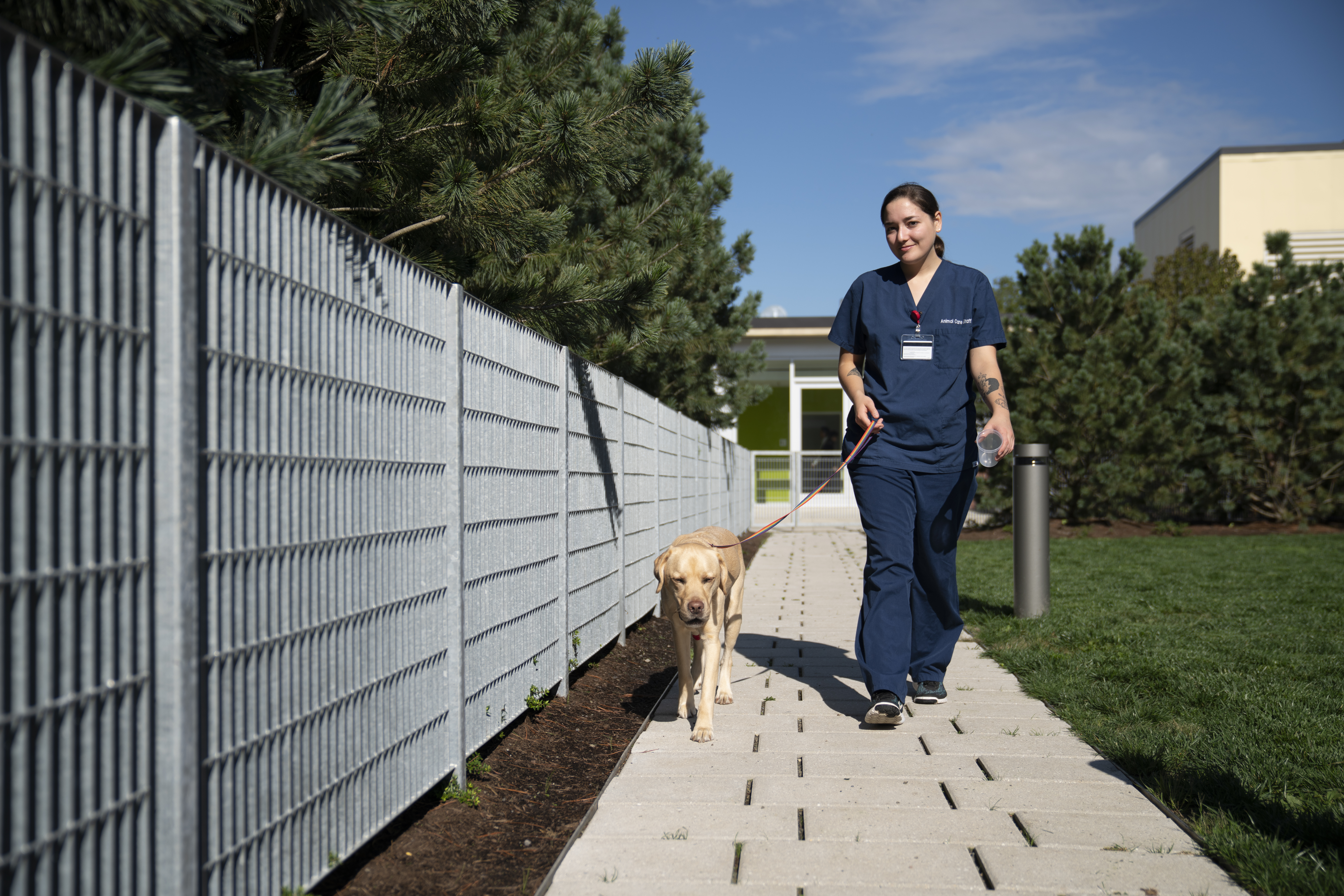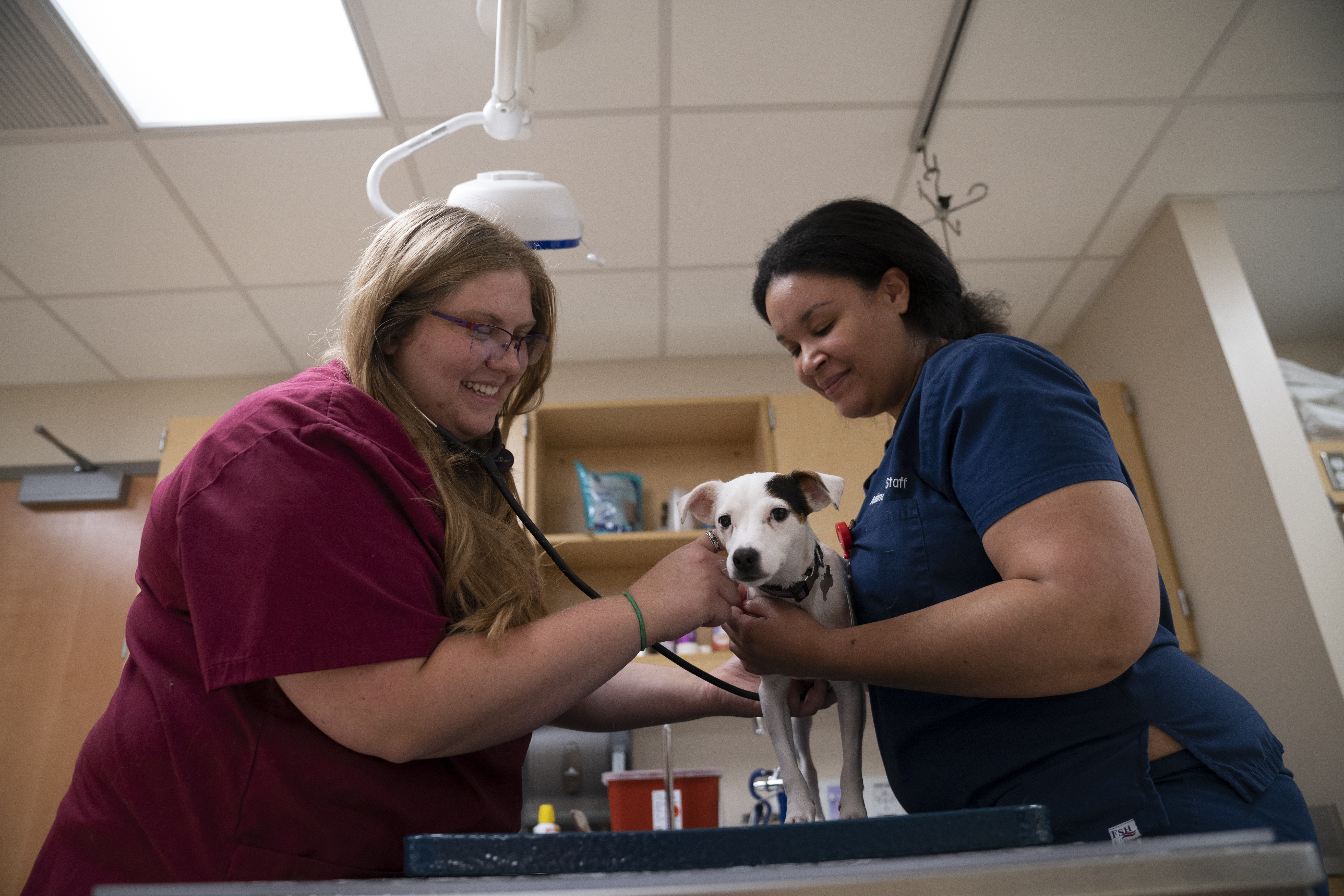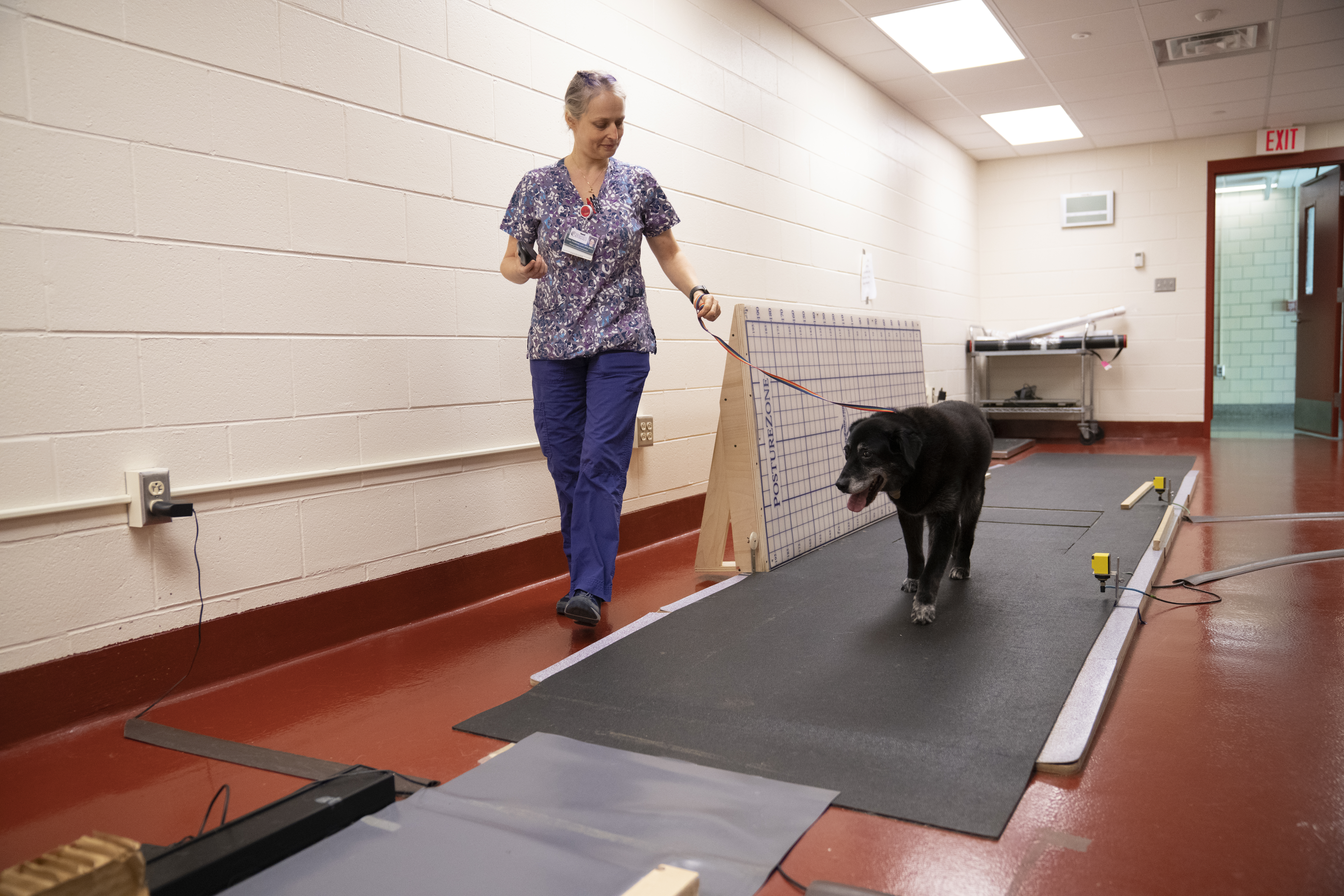Small Animal Surgery 4
Preceptors rotating through the Small Animal Surgery section will be exposed to a variety of surgical cases with either soft tissue or orthopedic conditions. Preceptors will learn proper aseptic techniques, instrument identification, proper instrument care/preparation, and sterilization methods.
They will shadow and assist the surgical technicians in their daily routines which include:
- Receiving surgical appointments and getting patient histories
- Helping restrain and assisting with physical exams, bandage changes, etc.
- Scheduling pre-operative exams for blood work, sedation, radiology, ultrasound, CT, MRI
- Helping set-up operating rooms and assisting in surgery
Small Animal Anesthesia 3
The small animal anesthesia department coordinates, creates plans for, and performs anesthesia for orthopedic surgeries, soft tissue surgeries, ophthalmologic surgeries, neurology surgeries, MRIs, CT scans, endoscopies, dentistry procedures, and others. Primarily, preceptors will observe pre-medication, induction, maintenance of inhalant anesthesia, and recovery. Preceptors may have the opportunity to assist LVTs and residents with tasks such as:
- Creating an anesthetic plan (look up history, bloodwork, physical exam, choose drugs, etc)
- Helping calculate drug dosages and drawing up drugs
- Helping pre-medicate, place IV catheter, induce, intubate, administer inhalant anesthesia, and recover patient
- Helping place monitors on the patient and recording information on the anesthesia record
- Restraining patients for physical exams, pre-medication, and IV catheter placement.
Ophthalmology 1
On the ophthalmology service, preceptors will be able to observe surgeries and assist LVTs with appointments. Common procedures on this service include cataract surgery, lens luxations, nictitan gland replacements, laser pexy, ERG, and others, primarily on small animals. Preceptors will be able to sit in on rounds or short lectures with the students. Some tasks the preceptor may perform include:
- Restraining patients for examinations, medications, and blood draws
- Administering medications, such as eye drops
- Drawing blood
- Setting up equipment for procedure
Small Animal Internal Medicine 4 *
Internal Medicine visualizes and treats the body as a whole; we consult and coordinate with each hospital specialty, as needed, to improve outcomes for our patients. Our service primarily receives stable to critical Cornell Emergency patient transfers, stable to urgent referral appointments with acute and chronic disease, and perform consultations along with high level diagnostics and procedures in order to provide the highest level of care for our patients, and to gain a better understanding of differentials and disease processes. LVT Preceptors will be able to follow along with cases from admit and initial history, through performed diagnostics and consults, and later interpretation; train with five highly experienced LVTs; work closely with one medicine-focused intern, and a rotation of five residents and two faculty members each week.
Diagnostics typically performed include basic level complete bloodwork and urinalysis in our in-house lab and Cornell’s Clinical Pathology and Diagnostics lab, sample collection for our Clinical Trials Team which includes research and bio bank work, and advanced level referral testing samples sent to specialty labs around the nation. Regularly performed procedures include FNA's (blind and ultrasound guided), joint taps, bone marrow aspiration, Radiation Iodine Therapy with Nuclear Scintigraphy, Ultrasound, Radiology, CT, rhinoscopy, cystoscopy, endoscopy (upper, lower, foreign body removals), laparoscopic liver biopsies, skin biopsies, esophagostomy tube placement, gastric feeding tube placement, balloon dilation, among many others. LVT Preceptors may have the opportunity to assist with:
- Blood collection, IV catheter placement, or cystocentesis
- Restraining patients
- Setting up for procedures
- Assisting with procedures
- Administering sedation and monitoring sedated/anesthetized patients
- Processing laboratory samples
Exotics 1
The exotics department performs a variety of functions, from routine physical exams to surgical procedures on exotic patients such as rabbits, rodents, reptiles, and birds. While on exotics, preceptors can expect to observe handling and restraint of various species, client communication, blood collection, medication administration, sedation/anesthesia, surgical procedures, radiographs, and other various procedures. Preceptors should be aware that they may only be able to observe on this rotation, as some patients become stressed easily or are critical. If possible, preceptors may be able to participate in tasks such as:
- Blood collection and quick assessment tests
- Assisting with anesthesia, radiology and surgical procedures
- Assisting with subcutaneous fluids, oral medications, and injections
- Feeding patients and other patient care
- Maintaining cleanliness of facility and restocking of area
Community Practice Service 4 *
Community Practice Service (CPS) operates similarly to an independent general practice. The preceptor on this rotation will observe physical exams, vaccinations, surgeries such as spays and neuters, blood tests, and referrals. While on CPS, preceptors may be able to participate in tasks such as:
- Restraining for physical exams
- Blood collection
- Vaccinating
- Assisting LVTs prepare for surgeries
- Observing anesthesia protocols
Dermatology 2
The Dermatology Service at the Cornell University Hospital for Animals provides specialty care for companion animals with skin and ear conditions. We offer state-of-the-art diagnostic techniques and treatments, including digital video ear examinations, intradermal and serologic allergy testing, cryotherapy and have CO2 laser capability.
Preceptors will primarily observe examinations, sample collection, and anesthetized procedures. Preceptors may have the opportunity to assist LVTs, interns, and residents with tasks such as:
- Restrain patients for physical exams, treatments, sedation, blood collection
- Help monitor patients during and after sedation
- Help prepare and stain cytology slides
- Facilitate the workflow of cases and procedures
Neurology 5 *
The Neurology Service here at Cornell is a nine-person service meeting the needs of patients both medically and surgically. On a two week rotating basis we have anywhere between 2-6 students on with us. We receive appointments on a scheduled basis as well as emergency receiving. Some of the most common reasons we see patients are intervertebral disc disease, epilepsy, pain management, long term seizure management, trauma (brain & spine), inflammatory and infectious diseases (and so much more!). We utilize different imaging modalities to diagnose our neurologic patients such as radiographs, CT scans and MRIs.
As a LVT preceptor on our service you may have the opportunity to assist with any of the following:
- Restrain for cerebrospinal fluid collection
- Perform basic venipuncture
- Place intravenous catheters
- Bladder expression
- Urinary catheter placement
- Cystocentesis
- Neurologic Examination
- Physical Examination
- Assist with Operating Room duties
- Perform blood pressure
- Basic physical therapy
- Post operative patient management
Shelter Medicine 5 *
The Maddie's Shelter Medicine Program at Cornell University works directly at the local Tompkin's County SPCA to provide care for the homeless animals in the area. In partnership with Cornell, the shelter provides daily medical care including intake exams, surgeries, preventative medicine, and post adoption support to its patients. As a technical student, you will be hands on daily providing direct care to over 40+ animals in the shelter environment on tasks including, but not limited to:
- Intake Examinations: providing practice with vaccinations, blood draws, medication administration, and restraint of cats, dogs, and other small mammals (when applicable)
- High Volume, High Quality Spay and Neuter: providing assistance with LVTs to administer IM medications, intubate, prep for surgery, and recovery animals in a high volume fashion
- Medication Administration: providing knowledge on commonly used medications and how to administer to multiple different animal personality types (a great skill to have)
- Other aspects of the shelter as a whole you will get to tour and become familiar with include: animal care, adoptions, behavior, and so much more!
Large Animal Surgery 4
The large animal surgery service works with a variety of species such as horses, cows, goats, sheep, pigs, alpacas, llamas, camels, reindeer and many more. Our service provides outstanding surgical care for large animals with a wide range of medical conditions both elective and emergency care. Diagnostic capabilities include high resolution radiology, CT, MRI scanning and endoscopy. Procedures are performed in state-of-the-art surgery suites fully equipped with equipment for both traditional open surgery and for laparoscopic procedures. We work as part of a team with a broad range of specialists including anesthesiologists, internists, dentists,radiologists and other specialists to ensure our patients receive the most comprehensive care possible. Our experienced staff provides nursing care 24 hours a day.
The Orthopedics Service is nationally and internationally recognized as a leader in the treatment of musculoskeletal conditions. Our staff includes board-certified veterinarians who have pioneered many of the approaches used for diagnosis and treatment of joint and bone disorders. They are assisted by skilled surgical residents and veterinary technicians.
Common Procedures:
- Farm Animal
- Abomasal displacement or volvulus, hardware disease (Rumenotomy) and atresia coli in calves
- Cesarean section, castration and hernia repair
- Management of Urolithiasis (blocked sheep or goat)
- Equine
- Exploratory Laparotomy (colic), hernia repair, Cesarean section
- Laparoscopic Cryptorchidectomy Castration and Ovariectomy
- Sinus surgery for cysts, neoplasia and dental disease
- Upper airway surgery including Tie back, Tie forward, Ceratohyoidectomy
- Fracture repair, Arthroscopy
- LVT Preceptors may have the opportunity to assist with:
- Preparation of induction room and surgery suite
- Assist in induction, positioning and patient prep
- Identifying surgical equipment and sterile procedure
- Gowning and gloving techniques
- Assist during surgical procedures
Large Animal Internal Medicine Service 3 *
The Large Animal Internal Medicine Service here at Cornell works with equine and farm animal patients to diagnose and treat various conditions and care for hospitalized patients. We have one chief of service, two residents and two LVTs on at a time. On a two week rotating basis we also have anywhere between 2-6 students on with us. We receive appointments on a scheduled basis as well as emergency receiving. Some of the most common reasons we see patients are colic, dystocia, pneumonia, neurological signs, fevers of unknown origin, weight loss, diarrhea, airway evaluation, gastric ulcers, choke, (and so much more!). Common species we work with include equine, bovine, caprine, camelid, porcine and cervidae. We utilize different diagnostic testing to assess our patients including, bloodwork, ultrasound, radiographs, endoscopy, and CT. We also work closely with the Ophthalmology, Cardiology, Theriogenology services and help with workups of their large animal patients. Our favorite part about LAIM is that each day is different!
As an LVT preceptor on our service you may have the opportunity to assist with any of the following:
- physical examination
- set up and clean up for procedures
- basic venipuncture
- restrain for ultrasound and other diagnostic procedures
- nursing care of hospitalized patients
- run point of care bloodwork
- neurologic examination
- place IV catheters
- receive incoming emergencies
Large Animal Anesthesia 4
Large animal anesthesia LVTs sedate and/or anesthetize horses, cattle, alpacas, llamas, pigs, goats, sheep, and the occasional exotic/large wildlife animals for a variety of procedures. Preceptors will observe IM injections, IV catheter placement, premedication, induction, maintenance, ventilation techniques for large animals, and recovery of patients. Preceptors may have the opportunity to assist LVTs and residents with tasks such as:
- Administering IM and IV injections
- Placing IV catheters and arterial catheters
- Assisting with induction and intubation
- Placing monitoring equipment on patient
- Operating the anesthesia machine and syringe pumps
- Keeping an anesthetic record
- Assisting with extubation and patient recovery
Ambulatory and Production Medicine Service 1
This will be a one-week rotation combined with Large Animal Surgery or Large Animal Medicine for a total of a two-week rotation.
The Ambulatory Service at Cornell works with cows, horses, sheep, goats and pigs on the client's farms to treat and help prevent diseases. There are 7 professors/clinicians, 1 clinical instructor, 2 residents, and 1 intern. We are a required rotation and therefore have anywhere between 5-8 DVM students on for 2 weeks. Clinicians travel with students to local farms and typically perform herd health services, pregnancy checks, vaccines, and emergencies daily. We never know what the day will bring.
As an LVT preceptor on our service, you will spend 2 days on the road (space is limited and will be available at short notice, please come prepared to go on the road every day while on this rotation.) The other 3 days will be in the Ambulatory Clinic as a technician.
As an LVT preceptor on our service, you have have the opportunity to experience the following:
- Physical examinations
- Participate in student rounds, including those held at our teaching dairy
- Set up for procedures and clean up afterwards
- Submit diagnostic samples for testing
- Understand pharmacology and restock pharmacy
- Identify surgical equipment, clean, package and sterilize equipment
- Make up and prepare medications for patients





